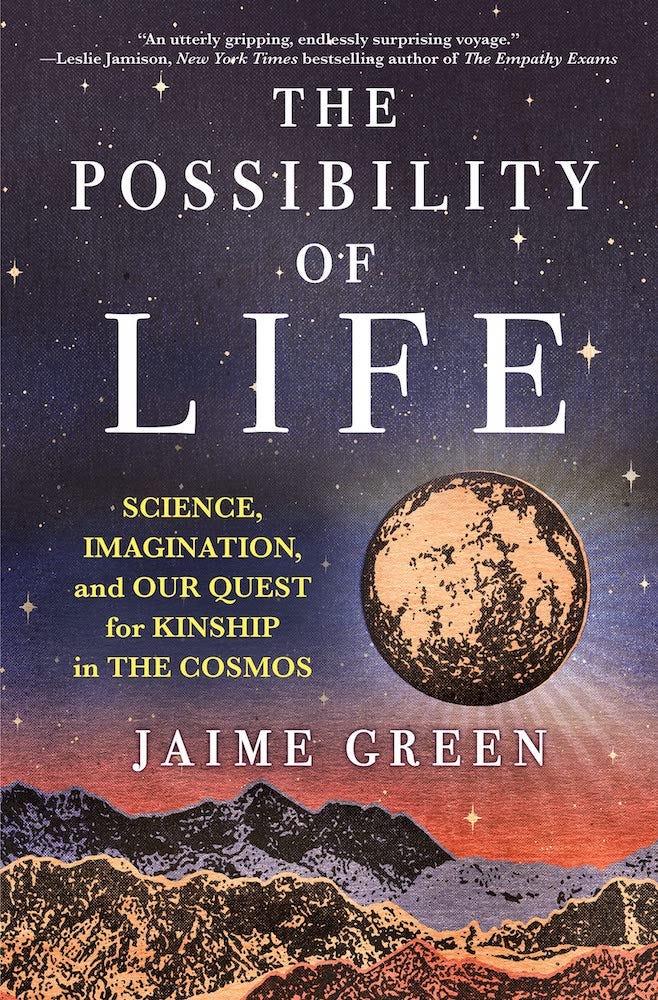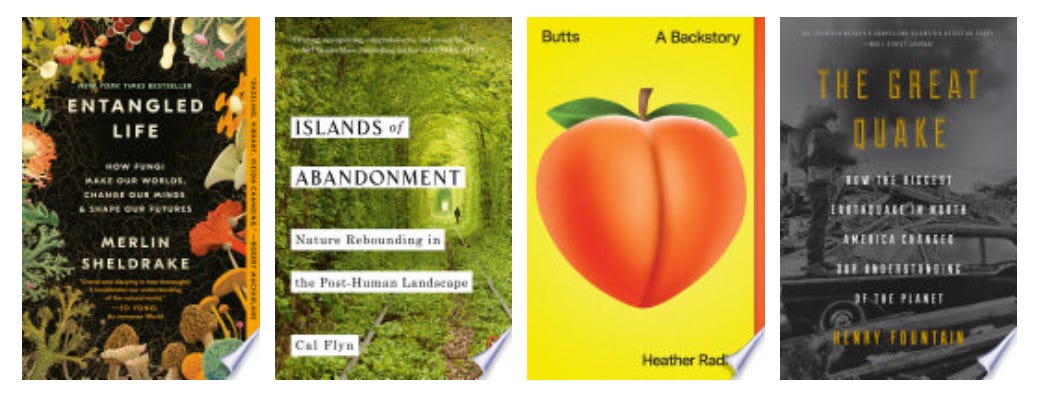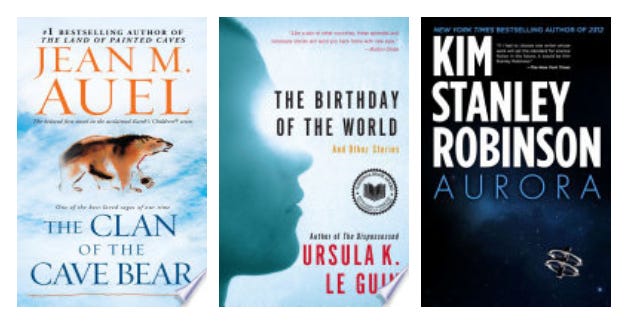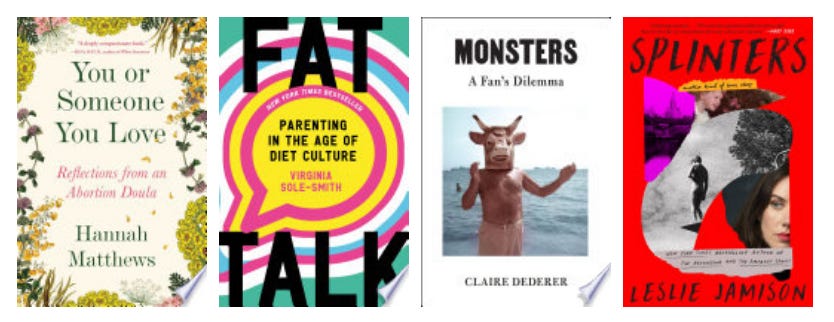(book links are affiliates bc why not!)
I published my book this year, yes, okay. Let’s get that one out of the way—if you’re reading this, you surely know, and probably/hopefully have read it. If you have done so, thank you. Just for reading the book, it’s still amazing to me that that happens.
Mainly, though, I want to share other things today: other things I read, wrote, and a little bit about music. I’d share about what I watched, too, but that’s basically just Taskmaster and basketball—they’re both great, check them out, that’s all there is to say there.
Reading
I had a very slumpy reading year, moving slow through a stressful summer and stalling out entirely for most of the fall. I love reading, it keeps me sane, but chicken or egg it wasn’t happening. I’m finally back in the groove I think, with Naomi Klein’s Doppelgänger, which I’m early in but am loving, we can assume it makes my top list.
I continued getting good book-listening done on my drives to and from campus, settling into natural history and other nonfiction books on those long drives. I loved Entangled Life by Merlin Sheldrake, which I learned about when my UK publishers used it as a comp for my book; I thought it was a stretch of a reach for a popular comparison, but no, even though it’s about fungi and written by a researcher, there is a common motive, a kind of connection-seeking through the science, the hope to understand the world a little better through that lens. Sheldrake reads the audiobook, and lemme tell you, I love when the Brits do that.
Speaking of Brits and their beautiful audiobooks, I’m currently partway through Cal Flyn’s (she’s Scottish) Islands of Abandonment, which is about what nature does in places that humans, for many reasons, leave behind. It’s beautiful, sad, funny, smart, thoughtful—everything one could want from nature writing, a perfect winter drive compantion.
I also found kinship in Heather Radke’s brilliant (and brilliantly titled) Butts: A Backstory, essentially a cultural history of butts in American culture. It was fascinating, funny, and clearly the product of many delightful research rabbit-holes.
My favorite audiobook of 2023 and possibly favorite nonfiction was Henry Fountain’s The Great Quake, the story of the 1964 Alaska earthquake that led scientists to finally settle the debate around plate tectonics. I’ve always been fascinated by how recently plate tectonics became settled science; Fountain’s book delves well into that, but also the granular history of residents’ experiences of the quake. I didn’t expect to care as much about the history, but Fountain is absolutely masterful. I literally laughed and cried, many times—thinking about it I see the exact stretch of I-91 on which I listened to especially pivotal moments in the book. It’s a masterclass of nonfiction writing, and especially for writing about a disaster, tremendously humane.
I read very little fiction this year, nonfiction being my preferred audio sitch and audio being my most consistent reading medium. For research (see below) and book-launch nerves-soothing, I did a reread of the first four books of Jean Auel’s Earth’s Children series (skipping Jondalar’s chapters in The Valley of Horses, iykyk). I’ve loved these books since my early teen years, and the first three still totally hold up. I also reread Ursula K. Le Guin’s collection The Birthday of the World, because I was on a podcast talking about the novella Paradises Lost, and well might as well reread the rest of it! Brilliant, wonderful, romantic, human—you don’t need me to tell you Le Guin is the greatest.
Reading Paradises Lost on the heels of another but extremely different generation ship story was a little midfucky—Paradises Lost is like a perfect gem, while Kim Stanley Robinson’s Aurora is a sweltering jungle, a lush, exuberant tangle. I didn’t directly cite it in my piece (below) about space junk, but Robinson’s philosophy about space exploration and colonization was definitely humming under the surface.
I did manage some nonfiction books in print, which meant they were extraordinarily compelling:
’ You or Someone You Love, which I’d blurbed:You or Someone You Love sings with abundant empathy, generosity, and lyrical prose—I couldn't put it down. It changed how I see not just abortion but everything about how we care for the people we love, for strangers, for our communities. It expanded my heart and my sense of the possibilities of the world, not only through Matthews' knowledge and experience, but through the beauty she's packed into these pages. This is a book full of tenderness, anger, humor, hope, sadness, and delight, a vital and enlivening read.
Still true! Also
’s Fat Talk, vital, enraging, informative, and still somehow a joyful read; Monsters by Claire Dederer, the kind of personally intimate cultural criticism that I’m also loving in Doppelgänger right now; and an early copy of Leslie Jamison’s Splinters, which comes out in February, which—huh all of these books are in some way about mothering/parenting/loving ourselves and our children through the world. Anyway Splinters is gorgeous, LJ in top form.Writing
Here’s what I wrote this year, in case you missed it:
I Wrote a Book About Aliens. But My Favorite Ones Lived on Earth. Slate
Auel’s Neanderthals, as an alien kind of people, reveal what defines our kind. It’s not language, culture, spirituality, or love. Instead, it’s creativity. Adaptability and the capacity for intuitive leaps.
This came out the same week as my book, the same week as a bunch of excerpts and whatnot, and I really fear it got lost in the hubbub. I’d wanted to write about Auel—a love letter for sure—for ages, and I was so glad I had a reason to think through all this.
Uncertain Contact, Aeon
Alien life may not be something we ever “find”, but instead inch towards, ever closer, like a curve approaching its asymptote. For all our desire to know who’s out there, that may have to be enough.
Befouling the Final Frontier, New York Times Magazine
It is archaeology seen in real time, a calling card of sorts to the cosmos: Here on Earth, we have transcended the boundaries of the planet. ... With ingenuity and desire, we have extended the environment of our planet into space.
An Existential Problem in the Search for Alien Life, The Atlantic
How could we not trawl the cosmos for anything that could help us understand our place in it, our kinship lines, and how this life, on Earth, came to be? And so we try. We scour other worlds, scan their clouds. And scratch beneath the surface, for the theory that might explain it all in equation and abstraction, to see the deeper truth beneath what we can see.
If you read chapter one of my book and thought, she seems to have a lot more to say (and a lot more she wants to learn) about the study of the origin of life, whooboy were you right.
Listening
I’m just absolutely obsessed with Johnny Flynn and Robert Macfarlane’s new album, The Moon Also Rises. This song is my favorite:
That’s all from me. I hope your year was as good as possible. Wishing you justice and ease and peace in the year to come.








What a year, Jaime! I think a reading slump on the back half of the year you publish a book is a-ok.
I'll have to check out The Great Quake! My favorite read of The First Covid Year was Jon Mooallem's book about the Great Alaska Quake: This is Chance! Wow - it gave me such hope that people may actually be wonderful deep down and when emergency strikes.
Happy new year to you and yours -